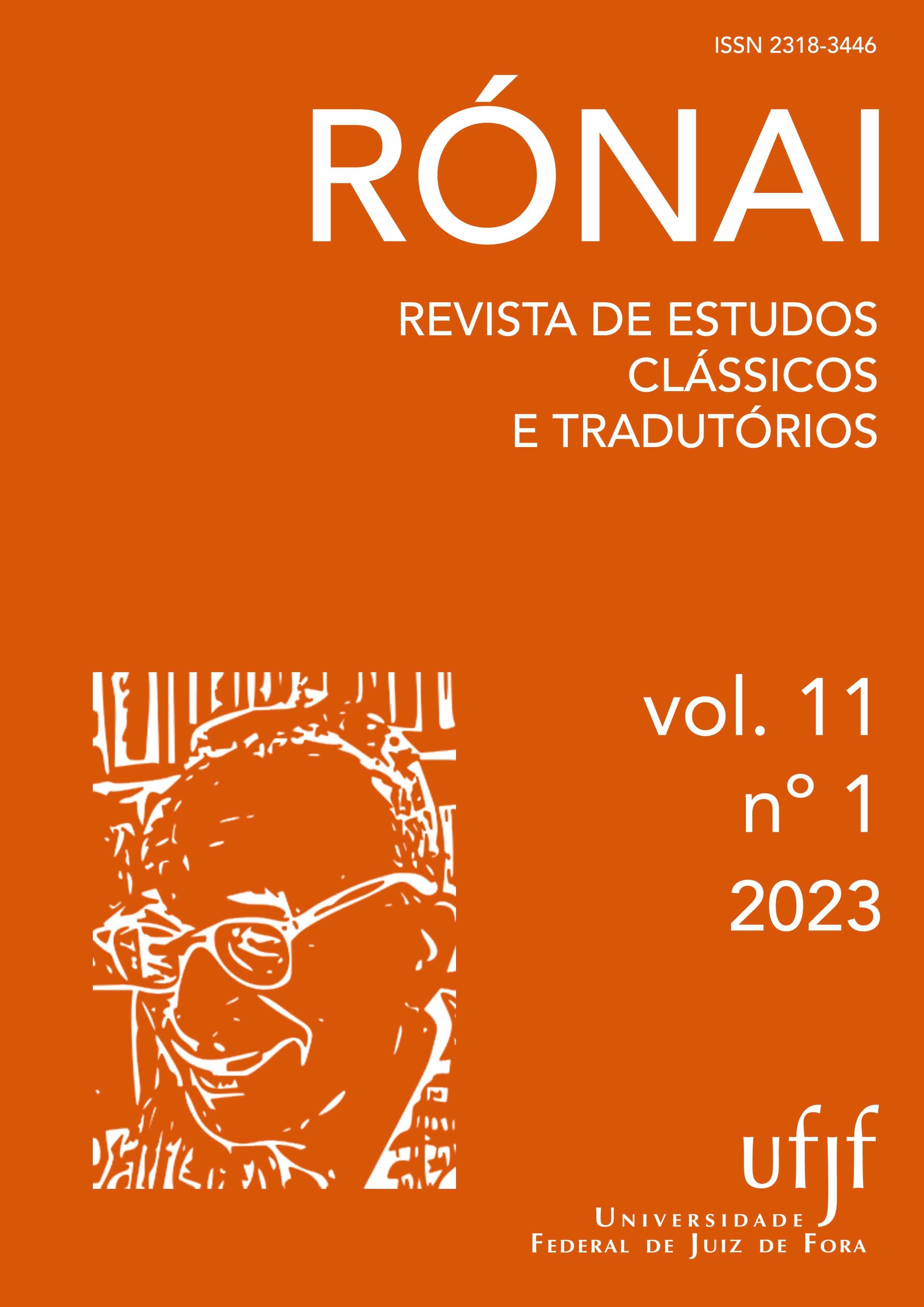Morte de Actêon (Ovídio, Metamorfoses, 3. 143-252)
DOI:
https://doi.org/10.34019/2318-3446.2023.v11.40230Palavras-chave:
tradução poética, hexâmetro datílico, dodecassílabo, Ovídio, MetamorfosesResumo
I present the translation of the 109 dactylic hexameters of the episode about the death of Actaeon, torn apart by his dogs, in an equal number of verses, a characteristic that I call “isosticheia”. For this purpose, given that the hexameter is a long verse and of variable tempo according to the caesuras, I used the dodecasyllable, which is the second longest of the most common verses in the Portuguese language and endowed with great variety, since it can have three tempos: 1) with main stress on the sixth syllable with synalepha, that is, the Alexandrian verse; 2) with main stress on the sixth syllable without synalepha; 3) with accents rarely incident on the fourth and eighth syllable. The episode, unlike what usually occurs in the Metamorphoses, is not etiological, and not being so contributes to it being pathetic, a condition that in this case is corroborated by the strangeness caused by the long and ostensible series of the Greek names of the dogs. The translation of these names is not obvious, but it is necessary to decide: to keep them in their Portuguese form, as I did (“Melampo” for Melampus, for instance), or in fact to translate them into Portuguese (“Negras-Patas” / “Black-Paws”, for Melampus comes from μέλας, “black”, + πούς, “paw”), as I exemplify with the translation that Jaa Torrano made of the names of the Muses in Hesiod’s Theogony? The decision, in turn, presupposes an analysis of the poem and theoretical reflection on the implication of each possibility.
Downloads
Referências
AZEVEDO FILHO, L. A. de. A técnica do verso em português. Rio de Janeiro: Livraria Acadêmica, 1971.
CARVALHO, A. de. Tratado de versificação portuguesa. 4ª ed. Lisboa: Centro do Livro Brasileiro, 1981.
CHOCIAY, R. Teoria do verso. São Paulo: McGraw-Hill do Brasil, 1974.
LAFAYE, G. Ovide, Les metamorphoses. Tome I. Paris: Les Belles Lettres, 1928.
OLIVA NETO, J. A. 11 poemas de Propércio traduzidos com o verdadeiro dístico elegíaco de Péricles Eugênio da Silva Ramos. In: Oliva Neto, João Angelo (org.), Cadernos de literatura em tradução, São Paulo, v. 15, p. 151-184, 2015.
TARRANT, R. J. P. Ovidi Nasonis Metamorphoses. Oxford: University Press, 2004.
UREÑA PRIETO, M. H. de T. C.; UREÑA PRIETO, J. M. de T. C.; PENA, A. do N. Índices de nomes próprios gregos e latinos. Lisboa: Fundação Calouste Gulbenkian / Junta Nacional de Investigação Científica e Tecnológica, 1995.
Downloads
Publicado
Como Citar
Edição
Seção
Licença
Copyright (c) 2023 João Angelo Oliva Neto

Este trabalho está licenciado sob uma licença Creative Commons Attribution 4.0 International License.
Direitos Autorais
Autores que publicam nesta revista concordam com os seguintes termos:
1. Autores e autoras mantém os direitos autorais e concedem à revista o direito de primeira publicação, sendo a publicação licenciada sob a Creative Commons Attribution License 4.0 Internacional.
2. Os autores e autoras têm permissão e são estimulados(as) a publicar e compartilhar o trabalho com reconhecimento da publicação inicial nesta revista.
3. Os autores e autoras dos trabalhos aprovados autorizam a revista a ceder o conteúdo de seus trabalhos, após sua publicação, para reprodução em indexadores de conteúdo, bibliotecas virtuais e similares.
Para mais informações sobre a Creative Commons Attribution 4.0 International License, acessar: https://creativecommons.org/licenses/by/4.0/
Isenção editorial
O conteúdo dos artigos publicados é de inteira e exclusiva responsabilidade de seus autores, não representando a posição oficial da Rónai - Revista de Estudos Clássicos e Literários ou do Faculdade de Letras da Universidade Federal de Juiz de Fora ou das instituições parceiras.



